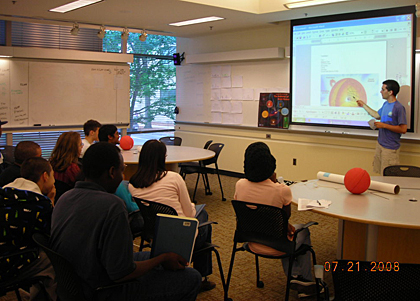The Chandra Astrophysics Institute, Part II
Peter Ashton relates his experiences with the Chandra Astrophysics Institute as an assistant instructor and as a former student.
(Continued from Part I)
---------------
It was the summer of 2003 when I first heard of Chandra. I was a high school junior growing up in Pennington, New Jersey, and like most high school juniors, I had only the vaguest of ideas about what I planned to do with my life after graduation. I knew I was interested in science, but at that point I had an equal probability of settling into physics, engineering, math, or maybe even chemistry. Still, I had always had a particular interest in space and astronomy, so when I heard about an opportunity to spend the summer studying X-ray astrophysics at the Rutgers Astrophysics Summer Institute (ASI), I jumped at it.
Five years later, I found myself a graduate of the Boston University class of 2008 with a degree in Astronomy and Physics. Furthermore, in my search for something interesting to do in the summer after college, I stumbled upon the Chandra Astrophysics Institute (CAI), the offspring of the Rutgers program I had similarly stumbled upon in my youth. Since the spring of this year, I have helped out with CAI, first with planning and developing the activities for the summer, and later by guiding groups of students through those activities. This wasn't my first experience on the education side of the equation, but because of my own history with ASI, CAI took on a personal tone for me. I've found that because of my experience at Rutgers, I've taken my present situation that much more seriously.

Peter Ashton at CAI
I don't think it's an exaggeration to say that my time in ASI has had more far-reaching effects on my life than any other four-week period before or since. It was during that time that my academic probability function finally collapsed down onto astronomy. That was what made me realize that astronomy could be more than just my hobby - that there exist people who build careers on such research, and I could be one of them. I learned how awesome it can be when a few simple people look at an image and a graph and learn something real about the universe.
So now, knowing how important my experience was to me, I'm forced to wonder and question - were we able to similarly inspire the students in this year's CAI? Did we emphasize the important ideas enough? Did we spend too much time teaching material that isn't so central to the students' projects? Should we have talked more about gravity? Less about colors? More math? Less writing? Is it too much to expect from high school students that they make the same choices I did and turn out just like me?
Truly, that combination of responsibility and uncertainty can be dizzying at times.
The beauty, though, is that it's not just about astrophysics. True, programs like CAI and ASI give students a solid base in astronomy, should they choose to pursue that further. However, the research skills that students gain from these programs are applicable to many different fields in science. The alumni of CAI and ASI who I know are now involved in computer science, biochemistry, earth science, engineering, and physics, to name a few. Furthermore, even if the students never take another science class after high school, or they never read another science book, they will have taken away some other lifelong skills from our class. They will be able to think critically about a problem, ask pertinent questions, develop a sound argument, present their ideas coherently, and really think about why they believe the things that they do. When they reach the "real world," these students will become better thinkers, better voters, better consumers, better parents, and better citizens.
Maybe I'm being too ambitious, but kids these days need every advantage they can get. If Chandra can help give them a leg up, as it did for me, then perhaps it's an even more powerful telescope than anyone ever imagined.
-Peter Ashton, CAI
Please note this is a moderated blog. No pornography, spam, profanity or discriminatory remarks are allowed. No personal attacks are allowed. Users should stay on topic to keep it relevant for the readers.
Read the privacy statement
